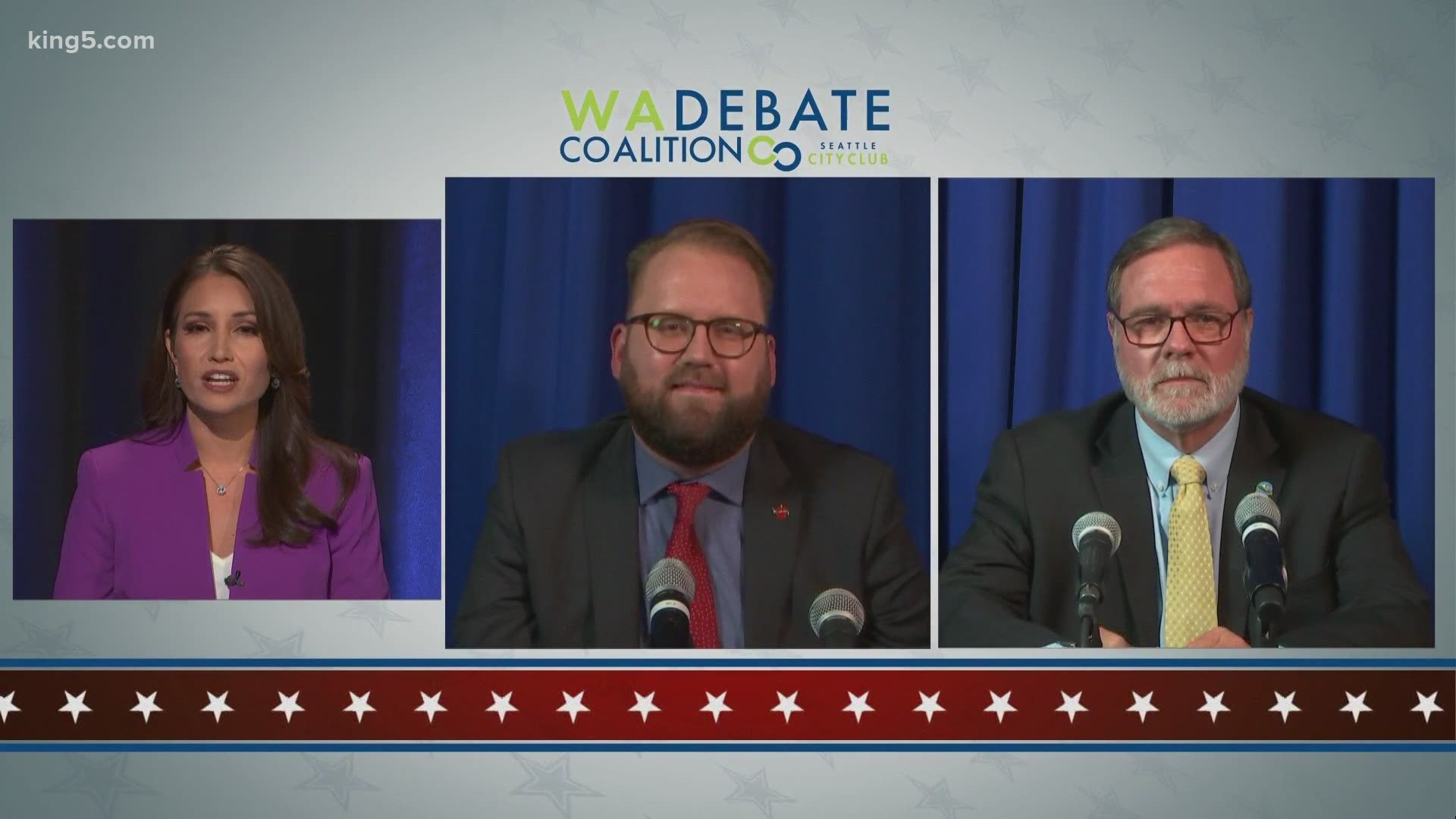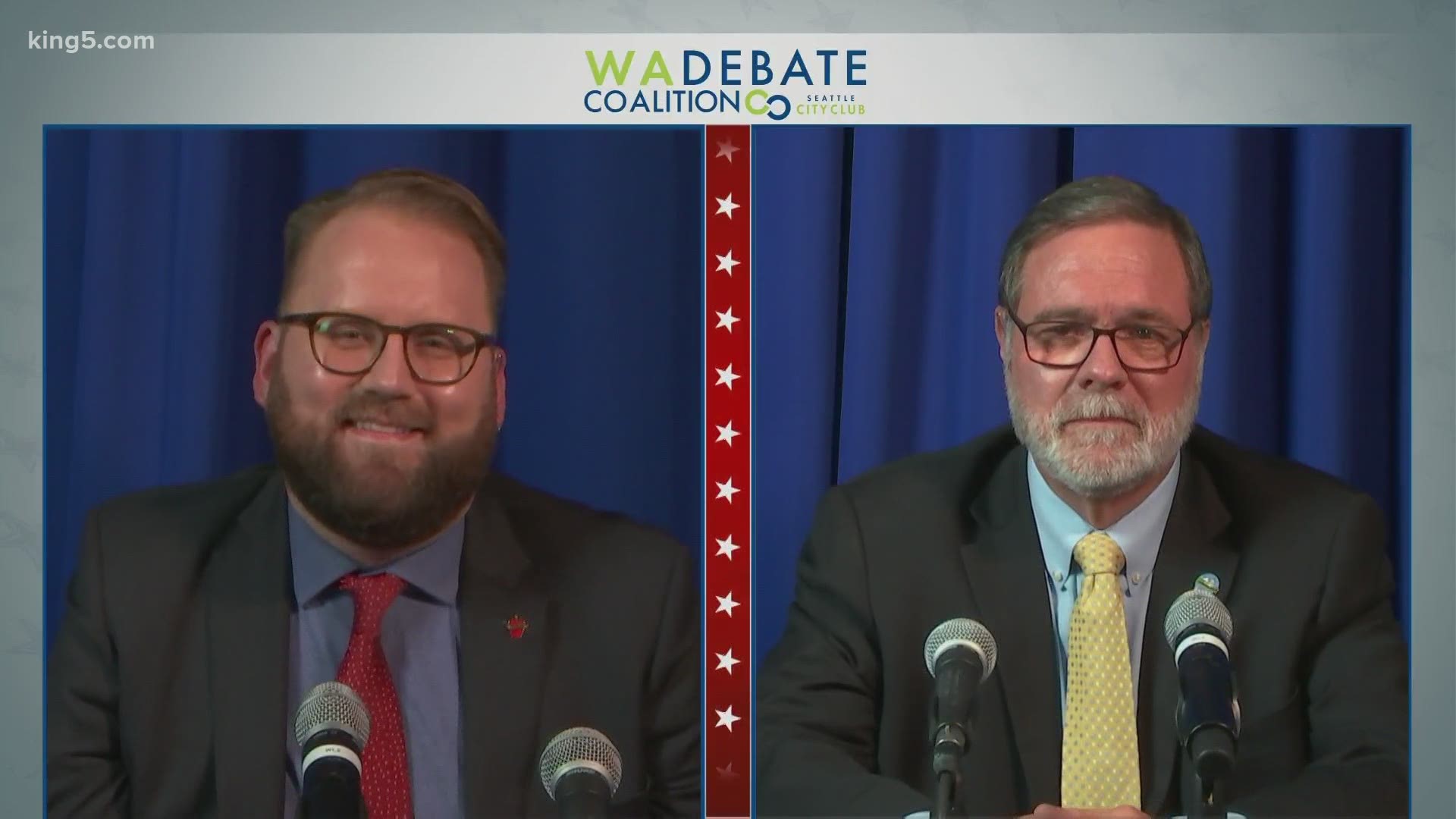Washington lieutenant governor hopefuls Denny Heck and Marko Liias traded barbs Thursday in a televised debate.
Lieutenant governor is the second-highest elected office in Washington state, and the next in the line of succession for governor.
After a primary with nearly a dozen contenders, State Sen. Liias and Congressman Heck, both Democrats, will be on the ballot for the position of lieutenant governor. Republican Joshua Freed, who lost in the gubernatorial primary with 9% of the vote, has launched a write-in campaign for the office.
Incumbent Lt. Gov. Cyrus Habib opted not to run for re-election after he decided to join the clergy.
Both candidates focused on their records. Heck was in state elected office for 10 years, and has served in Congress for seven years.
"Most of my public service career has been devoted to state government it is where my heart is It is where my passion is, and I think there are a lot of problems here that I can bring my experience to bear in helping our state move forward," Heck said.
Liias has been in state elected office since 2008, the last six in the State Senate.
"My record in the senate for the last six years has been working with Democrats and Republicans, when I was in the minority and in the majority in the senate," Liias said, touting the state's family leave program as a bipartisan effort.
The lieutenant governor, as second in line of succession, would serve as governor through the next general election if that person ever left their position.
Both candidates were asked at the debate whether they would run for governor in 2021 if Gov. Jay Inslee left next year for a role in a theoretical Joe Biden presidential administration.
Liias and Heck both said they would not run for the top job in 2021 under that hypothetical situation.
“I am not seeking this office as a retirement job, or a springboard to higher office,” Liias said. "I would return to my post as lieutenant governor. This is the job I want. This is the job I am qualified for. And it’s the best place for me to make the bold transformational changes we have in this moment in our state. Expanding health care, education, building an economy that works for everyone."
"But I have said from day one, under no circumstances would I seek re-election as governor which would occur in November of ‘21," Heck said. "Whomever is governor in the January '21 session is going to be airdropped into dealing with the three crises we’ve talked about, the pandemic, the economic recession and the budget shortfall. And they must be focused like a laser on helping to solve those problems and not be off and setting a campaign and running for governor."
What exactly does a lieutenant governor do? Here are the responsibilities of the second-highest .
Runs the State Senate
During the legislative sessions, the lieutenant governor serves at the President of Senate, no matter which party is in the majority. The lieutenant governor leads the parliamentary discussion of bills and makes decisions on floor procedures.
He also plays an important part in determining which bills advance to the Senate floor for debate and a vote.
Acting Governor
While the lieutenant governor and the governor positions are voted on separately, the lieutenant governor steps in for the governor when the governor is unable to serve due to illness or travel, or any other reason.
When acting as governor, the lieutenant governor has all the powers as governor, including firing department heads and making policy changes. But in practice, lieutenant governors in this state have not made major policy shifts while acting governor, though past lieutenant governors have signed declarations of emergency.
Economic Development and International Relations Chair
By state law, the lieutenant governor is the chair of the Legislative Committee on Economic Development and International Relations (LCEDIR). This bipartisan committee of legislators studies and reviews economic development and policy, focusing on international trade, tourism and industry.
State Committee Positions
By law, the lieutenant governor serves on the following committees:
- Senate Committee on Rules: The 21-member body that determines which legislation advances to the floor of the Senate for debate.
- State Capitol Committee: Sets policy direction and provides oversight for capital buildings and grounds management.
- State Finance Committee: Sets state bonding investment strategies for state finances.
- Washington Health Care Facilities Board: Provides tax-exempt financing for capital funding of health care facilities.
- Washington Higher Education Facilities Board: Provides tax-exempt financing for capital funding of higher education facilities.
- Capital Furnishings Preservation Committee: Raises funds for maintenance and restoration of historic furniture
- Medal of Valor Committee: Selects honorees for the Washington state Medal of Valor award.
- Medal of Merit Nominating Committee: Selects honorees for Medal of Merit Award, recognizing individuals for outstanding service to Washington state.


